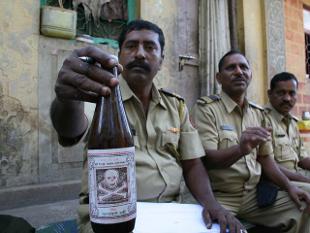Mumbai, Jun 20: The death toll in the illicit liquor tragedy in a country liqour bar in suburban Mumbai shot up to 81 on Saturday morning with the death of more people due to the poisonous brew, officials in Mumbai said.
 Several victims are undergoing treatment in various hospitals, and the condition of at least a dozen is said to be critical.
Several victims are undergoing treatment in various hospitals, and the condition of at least a dozen is said to be critical.
The toll was 20 on Friday noon, and suddenly shot up to 66 on Friday night with more people dying at short intervals and more being admitted with symptoms of poisoning during the day.
Police have cracked down on the law enforcers by suspending eight officials, including senior Police Inspector of Malwani police station Prakash S. Patil, three officers and four constables, Deputy Commissioner of Police Kulkarni said.
Three people, identified as Raju Hanumant alias Langada, Gautam Avde and Donald Robert, were arrested for the tragedy as they allegedly transported illicit pouches of liquor from the Vasai-Virar region in adjoining Thane.
They were presented before a Mumbai magistrate who sent them to police custody till 26 July.
Police are on lookout for three other accused, including a woman bootlegger, involved in supplying the poisonous concoction leading to the tragedy.
Maharashtra Chief Minister Devendra Fadnavis ordered an inquiry into the incident and sought a report within two days, an official spokesperson said.
The victims, mostly living in Laxmi Nagar slums and employed as low-paying drivers, daily labourers etc., had consumed the cheap country liquor at a bar in Rathodi village here on Wednesday night.
Since Thursday they started developing symptoms of poisoning, including vomiting, abdominal pain and burning sensation in eyes and sudden collapse.
Their alarmed family members rushed them to local hospitals, but some of them died on way. Many of the victims hail from Gulbarga region of Karnataka.
Minister of State for Home Ranjit Patil said Mumbai Police Crime Branch has taken over the probe into the incident.
Teams have been formed to trace the origin of the spurious liquor, those involved in brewing, selling and transporting it and other aspects, officials said.
This is the first major illicit liquor tragedy in Mumbai since December 23, 2004, when hooch claimed 87 lives.





Comments
Add new comment